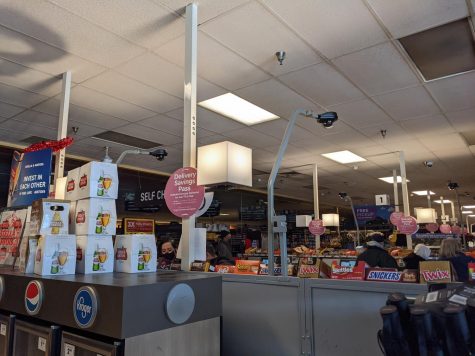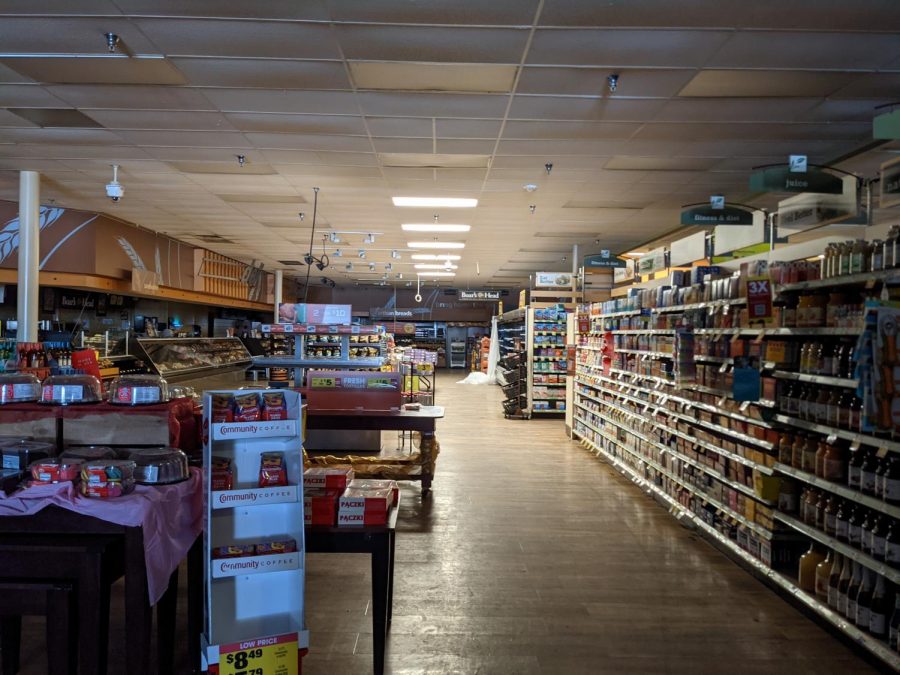Food Shortage Among Mansfield Blackouts
Businesses such as Kroger experienced a food shortage, affecting many, due to the snow storm.
What many thought was going to be a relaxing 3-day weekend with a possibility of snow, turned into over a week-long of state-wide outages that affected the majority of Mansfield. There were unpredictable weather and unpredictable outages that lasted for many days Food shortages and lack of refrigeration were some of the larger issues that came out of this tragedy, and there were many different responses to it.
Kimberly Wallace, Biology teacher, was affected by the recent blackouts across Manfield and the state. For almost 24 hours, Wallace’s home was without power. Due to the very low temperatures and no heating system, Wallace made the decision to seek out help and shelter with power.
“We were out of power most of Monday, so I think the power went out Sunday night since I woke up really cold. Most of Monday we went to stay with my parents because their electricity was on, and when we came back to check on the house Tuesday morning it was back on,” stated Wallace.
Ryan White, History teacher, lost power for a bit longer than Wallace. Starting at the beginning of the week, White had recurring issues with lack of electricity, and it took a little over 2 days for his power to return to normalcy.
“We lost power early Sunday morning around 1 am, and it was out for about 15 hours before it came back on for 3 hours. It went back off again for 12 more hours after and was sporadic for the next few days. We got our power back fully on Tuesday around noon, and didn’t have any outages after that,” stated White.

Leaving many foods unrefrigerated for about a day can lead to things going bad or food sickness. In order to prevent that, Wallace debated over the possibilities of what to do. In the end, she decided to do what she thought was the safest and most convenient choice.
“We left everything in the refrigerator because the trash wasn’t picking up. Why make more trash if they’re not picking up. So we just left it there and on Sunday, before the trash man came, we just threw away everything and got new groceries,” said Wallace.
Due to the widespread power loss, many homes were without electricity, heat, and water. But businesses such as stores and restaurants were affected as well. When Wallace went to the grocery store, some of the effects of loss of power included a lack of fresh items until later dates when the power returned.
“When I went to the store Friday night, big mistake. We went to the store in Arlington, and that store actually lost some of its power. By the time I got there, there was no milk, no eggs. It was pretty much wiped out. They weren’t selling any fresh food, just selling the processed food in the middle of the store. Luckily, when I got up early on Sunday, there were more options available,” states Wallace.
As a mother, Wallace had to account for her children throughout the time with no power. Her kids were not particular about the food they wanted, and she had no issues convincing them to eat, even though the food choice was limited.
“Luckily my kids are pretty good at eating what is in front of them. We had to host some of our family members, so we made big dishes like spaghetti, pancakes and eggs, and little things like that. My kids ate what was available to them, so we didn’t have any issues,” says Wallace.
White had a different strategy from Wallace in terms of how to handle the refrigerated foods to prevent or avoid spoilage. In order to keep his food cold, White converted his garage into a giant refrigerator. It worked a little too well and ended up freezing some of his foods due to the cold temperatures.
“There was not any spoilage with my refrigerated foods because I took a lot of the stuff out and put it in the garage, knowing it would be cold enough. Even when I did that, some of the stuff froze in my garage,” said White.
White is an experienced man in camping, hiking and backpacking. His hobby allowed him to be prepared for the unexpected, with plenty of backup supplies and plan B’s. White felt fully prepared for the possible loss of gas, further electricity loss, and food shortage.
“It was kind of like going back to camping gear and backpacking gear. We have a gas stove so that saved us a lot. In the event that our gas went out, we did break out some of my backup stoves, but luckily we didn’t have to use any of that,” states White
After White’s power had returned, he was host to his parents seeing as their electricity was still off. Even with the two new guests in his home, White had no issues regarding lack of food. His camping skills as well as his observations of the COVID-caused shortages in 2020 allowed him to be very prepared.
“My parents lost power for five days, so on Tuesday morning, I had to drive to Fort Worth and pick them up. Even with them with us, we had no problem with any food shortage. After the whole breakout of COVID last year, we really stocked up to make sure we had extra stuff. Especially since we saw how the grocery stores were then,” says White.
Though White did have the extra food prepared, he still took a trip to the grocery store a day after his power returned. As White expected, the grocery store was rather empty, and they left with less than what they came for. There were some sections, such as the meat section, that seemed untouched by the power outage, but that didn’t do White any good.
“We went to a grocery store on Wednesday afternoon, and it was not for anything that we desperately needed. Most of the stuff at the store was pretty picked over, so the place was pretty bare. The bread aisle was completely bare, but the meat was surprisingly still fully stocked. They were completely out of produce, the only thing we were able to get was onions,” said White.
Dylan Okoth, senior, is an employee of Market Street, a nearby Mansfield grocery store. With the outages also affecting grocery stores, many products, especially fresh and refrigerated products, were not available to customers. For Market Street, in particular, the outages lasted for 3 days, and even then, they were still low on products due to delayed truck deliveries.
“They lost power; it was off Monday through Wednesday. It was empty. There was not a lot of produce, and a lot of customers were asking for stuff but we had to tell them we didn’t have it. We ended up having to wait till the next week for a truck to come in with more stuff,” states Okoth.
The trucks would have normally been on time to deliver products and return the store to normal if they hadn’t felt that doing so would put people at risk. The various accidents on major highways across DFW went to show that driving on snowy roads was not safe enough for the delivery services to return to business. After the storm cleared and the roads were no longer icy, business returned to normal.
“The trucks were supposed to come in this week, but since the roads were icy and there was the whole incident in Dallas, they were kind of paranoid. They waited after the storm and when the roads got back to normal, we finally had trucks coming in,” says Okoth.
Okoth only managed to go to work one day out of the storm week, due to his own home losing power for several days. After the weekend of snowmelt and his power returned, he was free to go back to Market Street as an employee.
“I was supposed to go in one time but my family’s power was completely off so I told the manager I wasn’t able to make it. It got better on the weekend, so that is when I went back into work,” stated Okoth.
Due to the inability to work his usual hours, he got a lower paycheck than usual. Though expected, the decreased pay was still astonishing.
“It was probably the lowest paycheck I had since working there because I only ended up going in once. It was kind of funny though because I knew it was going to happen. It was still really shocking to see,” said Okoth.
With the high number of people losing power, many businesses and homes had to be mindful of how they handled their food. Whether it was disposing of any possible rotting food, having backup supplies, or waiting it out for the safety of others, many of those affected handled it with a clear plan. Most people have now recovered, and the food supply is back to normal.


